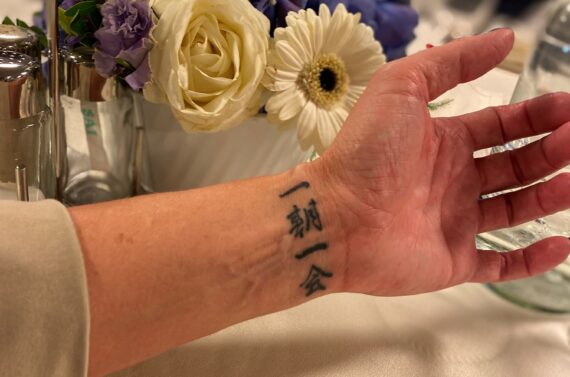
The hope of most participants attending executive education programs is that they will leave with fresh skills and knowledge to become better leaders. For Sulette Enslin, a corporate banker at South Africa’s Absa Group, IMD’s Transition to Business Leadership (TBL) program also resulted in a permanent physical change.
So struck was she by the concept of Ichi–go ichi–e, a Japanese idiom that describes the concept of cherishing every unique experience and encounter, that she got the kanji symbols tattooed onto her left wrist.
“This was my first and last tattoo,” said Enslin with a laugh, as she explained that it was inspired as a reminder to focus on what’s important, and that every interaction can offer a unique perspective and learning opportunity.
Like many people, the COVID-19 pandemic prompted Enslin to evaluate her life and individual purpose and led her to question whether she was happy in her job. TBL made her realize that she didn’t need to switch roles to find fulfilment in her career.

“You can craft your job in a way that fulfills you. I actually spend more energy and more time now on what I feel is my purpose inside of my job,” she said. “Of course, there will always be bureaucracy and things that you don’t like doing. But if you focus your passion and your power on the stuff that really is your purpose in your role, it gives you energy.”
From FOMO to JOMO
Enslin signed up for TBL to gain a “balcony view” of herself as a leader: her triggers and reactions, but also her blind spots, both professionally and personally.
An extrovert by nature, one of her key takeaways was to learn to sustain her own energy. During the program she socialized every night with fellow participants, and realized it affected her performance the next day. “You can’t pull two o’clock nighters and be tired at work, because you lead the team and your team actually needs your energy,” she explained.
This led to the realization that she needed to switch from a FOMO (Fear of Missing Out) to a JOMO (Joy of Missing Out) mindset. “I always fear missing out and I was always there at every single party. But I realized that JOMO is a real thing for me to work on to look after my own energy.”
Communicate the why
As part of the program, participants have to work on an organizational project. Following the pandemic, many of her team were happy working in their own silos at home and Enslin was struggling to motivate them to come back to the office. So, she chose to work on building the cohesion of her team.
The program taught her the importance of clearly communicating decisions.
“If your team knows why you’re doing things, why the strategy or why we’re going this route, they will follow and buy into it. They give it their all and you’re actually going in the same direction, which for me was a big lesson to learn,” she said.
Another major discovery for Enslin was that she disengages when people get loud, and she disagrees with their opinions. Now she focuses on actively engaging to see if she can uncover some unexpected insight. “That has changed our team dynamic completely by accident,” she said, adding that her team regularly enjoys sharing their opinions.
Holding back and speaking up
Enslin now takes time to actively listen instead of jumping in. “I always interrupt people when they talk because I’m excited about what they are telling me, and I want to add to it. For me, it’s important to have that reminder to also just to let them speak, to stay quiet. That’s one of the things that I’m constantly working on.”
By being vulnerable with her team she has been able to foster stronger connections, which is important in banking where relationships are crucial to business success.
Enslin has also had some tough conversations with her own managers and explained how their energy filters down and affects the broader team. She recently received feedback that all these interventions are paying off, with team members reporting feeling more content and a renewed sense of belonging.
“It’s not because I’m good. It’s because I was true to who I am and what I felt my purpose to be for the team, as well as all the tools that I got from TBL,” she said. “And it didn’t take a lot of time. But it’s small things that you can implement in your team that actually have a wider impact.”
Letting go to gain control
The program not only transformed her work life but also the way she interacts with her family. Previously, Enslin tended to jump in and do things for other people, including her children, because it saved time and gave her a sense of control. Inspired by Nassim Nicholas Taleb’s book Antifragile, she now consciously lets them do things for themselves, such as pack their lunches, cover their books, and arrange all their activities in a diary.
“There’s been tears and heartache and screaming, but they are getting more resilient,” she said. “And it has actually made a difference because I can see how much more independent they are than some of their friends.”
To try to decrease the busyness of her own days, Enslin practices meditation which has helped her feel as if things are less hectic.
“I always felt stressed and rushed and couldn’t get to everything. And I’m sure everything is still there, but I just feel more in control.”
Other tools that she has taken away from TBL include palming, a technique to relax the eyes, mind, and body, by covering the eyes with the palms of her hands. When she finds herself writing a difficult email, or is emotional and frustrated about something, doing palming for three minutes helps her find better words, says Enslin.
To make the most of the program, Enslin stresses the importance of regularly revisiting the material. When she returned to South Africa, Absa Group asked her to do a video summary of her learnings which proved really helpful.
“It’s easy to fall back into your routine and in busy business,” she said. “Sharing what you’ve learned with the team keeps you accountable for some of the things you’ve asked them to look out for you in yourself.”



